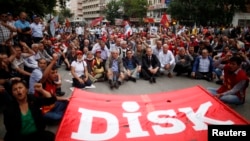The Turkish government says it may use the army to help stop anti-government protests after nearly three weeks of violent demonstrations in several cities across the country.
Deputy Prime Minister Bulent Arinc said Monday that if police power is not enough, "elements of the Turkish Armed Forces" will assist to maintain order.
His comments came as two major Turkish trade unions held a nationwide strike against the police crackdown on the Gezi Park demonstrators. The unions, which together represent hundreds of thousands of workers, called for police violence to "end immediately."
Most of the strikes were peaceful, but riot police faced off briefly Monday with about 1,000 trade union workers in the capital, Ankara. More marches took place in other cities, despite government warnings they would not be tolerated.
Small-scale clashes with protesters occurred in Istanbul on the sidelines of a demonstration called by labor groups.
On Sunday, Turkish Prime Minister Recep Tayyip Erdogan told hundreds of thousands of supporters it was his "duty" to evict the activists from Gezi Park and the adjacent Taksim Square. He said the two weeks of street protests were manipulated by "terrorists" and he dismissed opposition allegations that he was behaving like a dictator.
Protests in Turkey Timeline
Protests that started two weeks ago against government plans to tear down the park for new construction quickly built into nationwide protests against Erdogan. The demonstrators accuse him of imposing his conservative Islamic views on the country.
The prime minister told protesters last week that he would put redevelopment plans for the park on hold until a court rules on them. He also said he would hold a referendum on the issue if the court rules in the government's favor.
Deputy Prime Minister Bulent Arinc said Monday that if police power is not enough, "elements of the Turkish Armed Forces" will assist to maintain order.
His comments came as two major Turkish trade unions held a nationwide strike against the police crackdown on the Gezi Park demonstrators. The unions, which together represent hundreds of thousands of workers, called for police violence to "end immediately."
Most of the strikes were peaceful, but riot police faced off briefly Monday with about 1,000 trade union workers in the capital, Ankara. More marches took place in other cities, despite government warnings they would not be tolerated.
Small-scale clashes with protesters occurred in Istanbul on the sidelines of a demonstration called by labor groups.
On Sunday, Turkish Prime Minister Recep Tayyip Erdogan told hundreds of thousands of supporters it was his "duty" to evict the activists from Gezi Park and the adjacent Taksim Square. He said the two weeks of street protests were manipulated by "terrorists" and he dismissed opposition allegations that he was behaving like a dictator.
Protests in Turkey Timeline
Protests that started two weeks ago against government plans to tear down the park for new construction quickly built into nationwide protests against Erdogan. The demonstrators accuse him of imposing his conservative Islamic views on the country.
The prime minister told protesters last week that he would put redevelopment plans for the park on hold until a court rules on them. He also said he would hold a referendum on the issue if the court rules in the government's favor.
Some information for this report was provided by AP and Reuters.










